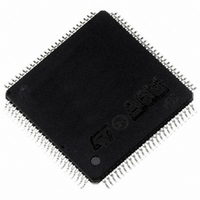STR736FV0T7 STMicroelectronics, STR736FV0T7 Datasheet - Page 36

STR736FV0T7
Manufacturer Part Number
STR736FV0T7
Description
MCU 32BIT 64K FLASH 100-TQFP
Manufacturer
STMicroelectronics
Series
STR7r
Datasheet
1.STR735FZ2T7.pdf
(52 pages)
Specifications of STR736FV0T7
Core Processor
ARM7
Core Size
32-Bit
Speed
36MHz
Connectivity
I²C, SPI, UART/USART
Peripherals
DMA, POR, PWM, WDT
Number Of I /o
72
Program Memory Size
64KB (64K x 8)
Program Memory Type
FLASH
Ram Size
16K x 8
Voltage - Supply (vcc/vdd)
4.5 V ~ 5.5 V
Data Converters
A/D 12x10b
Oscillator Type
Internal
Operating Temperature
-40°C ~ 105°C
Package / Case
100-TQFP, 100-VQFP
Processor Series
STR736x
Core
ARM7TDMI
Data Bus Width
32 bit
Data Ram Size
16 KB
Interface Type
I2C, SPI, UART
Maximum Clock Frequency
36 MHz
Number Of Programmable I/os
72
Number Of Timers
9
Maximum Operating Temperature
+ 105 C
Mounting Style
SMD/SMT
3rd Party Development Tools
EWARM, EWARM-BL, MCBSTR730, MDK-ARM, RL-ARM, ULINK2
Development Tools By Supplier
STR730-SK/HIT, STR730-SK/IAR, STR730-SK/RAIS, STR731-SK/IAR, STR730-EVAL, STX-PRO/RAIS, STX-RLINK, STR79-RVDK/CPP, STR79-RVDK, STR79-RVDK/UPG
Minimum Operating Temperature
- 40 C
On-chip Adc
10 bit, 12 Channel
Lead Free Status / RoHS Status
Lead free / RoHS Compliant
Eeprom Size
-
Lead Free Status / Rohs Status
Details
Available stocks
Company
Part Number
Manufacturer
Quantity
Price
Company:
Part Number:
STR736FV0T7
Manufacturer:
STMicroelectronics
Quantity:
10 000
Electrical parameters
36/52
Electromagnetic interference (EMI)
Based on a simple application running on the product (toggling 2 LEDs through the I/O
ports), the product is monitored in terms of emission. This emission test is in line with the
norm SAE J 1752/3 which specifies the board and the loading of each pin.
Table 20.
Absolute maximum ratings (electrical sensitivity)
Based on three different tests (ESD, LU and DLU) using specific measurement methods, the
product is stressed in order to determine its performance in terms of electrical sensitivity.
For more details, refer to the application note AN1181.
Electrostatic discharge (ESD)
Electrostatic discharges (a positive then a negative pulse separated by 1 second) are
applied to the pins of each sample according to each pin combination. The sample size
depends on the number of supply pins in the device (3 parts*(n+1) supply pin). Two models
can be simulated: human body model and machine model. This test conforms to the
JESD22-A114A/A115A standard.
Table 21.
Notes:
1. Data based on characterization results, not tested in production.
Static and dynamic latch-up
●
V
V
V
Symbol
Symbol
ESD(HBM)
ESD(CDM)
ESD(MM)
S
EMI
LU: 3 complementary static tests are required on 10 parts to assess the latch-up
performance. A supply overvoltage (applied to each power supply pin) and a current
injection (applied to each input, output and configurable I/O pin) are performed on each
Peak level
EMI data
ESD Absolute Maximum ratings
Electrostatic discharge voltage
(human body model)
Electrostatic discharge voltage
(machine model)
Electrostatic discharge voltage
(charge device model)
Parameter
Ratings
V
T
All packages
A
DD
=+25°C,
=5.0V,
Conditions
T
0.1 MHz to 30 MHz
30 MHz to 130 MHz
130 MHz to 1 GHz
SAE EMI Level
A
frequency band
=+25° C
Monitored
Conditions
6/36 MHz 8/8 MHz
[f
23
37
20
OSC4M
4
750 on corner
Max vs.
pins, 500 on
Maximum
value
others
2000
/f
200
MCLK
3.5
30
34
1)
7
STR73xFxx
]
dBµV
Unit
Unit
V
-


















